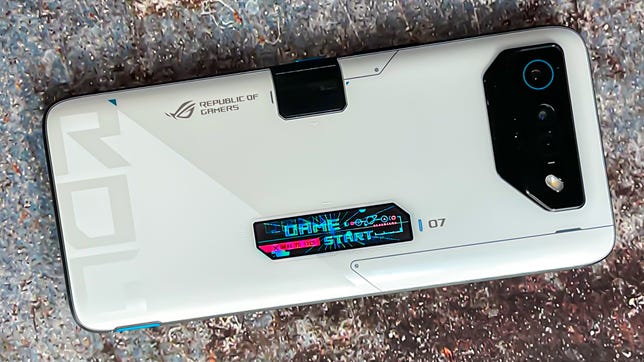The Asus ROG Phone 7 Ultimate is a gaming phone that takes a few small steps forward with its design, and substantial leaps ahead when it comes to its internals and software. The phone, revealed Thursday with a starting price of $1,000, keeps many of the design aesthetics and personality of last year’s Asus ROG Phone 6 Pro. These include its LED indicator on the back, a 6,000mAh battery that can easily last two days and a highly responsive touchscreen with a 720Hz touch sampling rate. But it’s inside where the most substantial changes are including an upgraded Qualcomm Snapdragon 8 Gen 2 chip and new software features for customizing game play.
There’s even a hidden door on the back of the phone, dubbed the AeroActive portal, that opens when you attach the included AeroActive Cooler 7 fan. This door helps blow cool air directly into the phone to keep it from overheating during longer gaming sessions.
These gaming-specific features arrive alongside improvements to how the new ROG functions as a phone, too. Asus is committing to two years of software updates and four years of security updates. That’s on the low side compared to the four years of software updates Samsung provides for its Galaxy S series, but it’s still good to see Asus now commit to such a support timeline. The Phone 7 Ultimate also has a Background mode to set an automatic task up in any game and have that run while you use the phone for anything else.
Like
- Striking design
- Lots of custom options
- AeroActive Portal opening for cooling
Don’t Like
- Tall and heavy
- Photos lack detail
- No wireless charging
Yet even with these improvements, the Phone 7 Ultimate still prioritizes gaming over other functions and features that typically get the spotlight in this price range. Specifically, the Asus phone is tall, partly because the front-facing camera is placed in a bezel above the 6.7-inch AMOLED screen instead of within a display cutout like on many other Android phones. This could benefit gamers since you don’t have anything obstructing the gameplay on your screen. But if you’re used to a large-screen phone like the Galaxy S23 Plus or the iPhone 14 Pro Max, you might wince at the ROG being even bigger than its display. The phone also feels heavy, coming in at 239 grams (just a gram shy of the iPhone 14 Pro Max) compared with the similarly sized 196-gram Galaxy S23 Plus.
The phone lacks wireless charging but makes up for that with speedy wired 65W charging. And yes, the power brick is even included in the box.
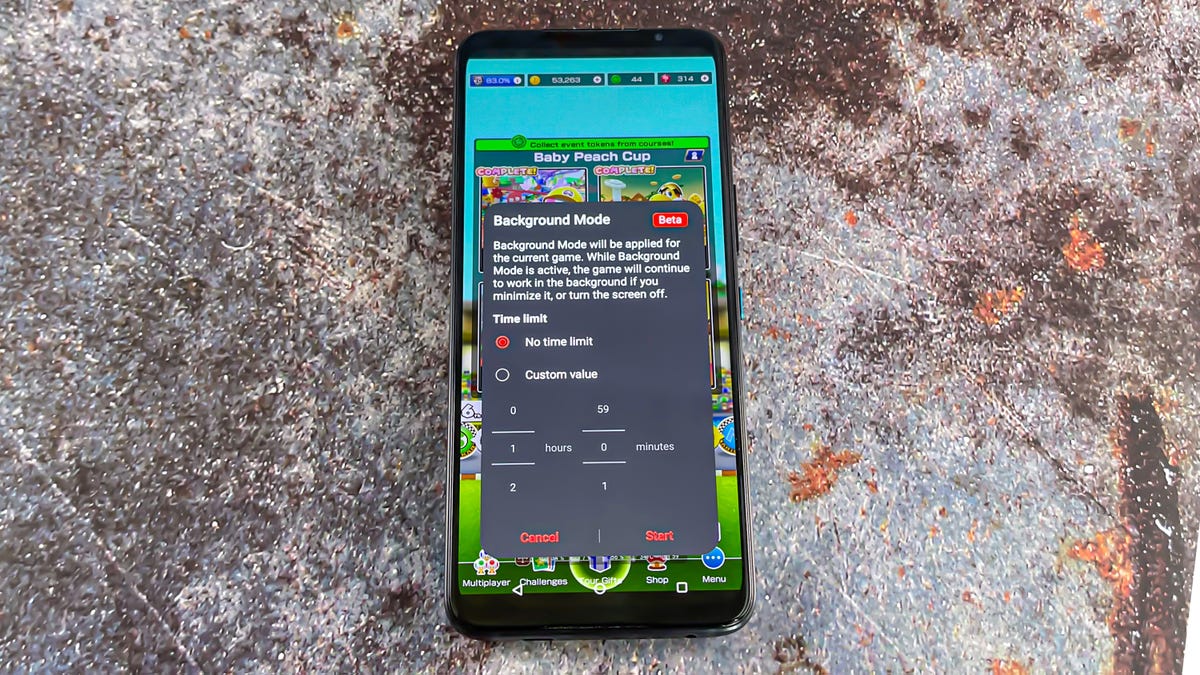

Background mode lets you continue running a game while you use your phone to do other things.
Mike Sorrentino/CNETPhotography is fine. It’s not in the same league as what the cameras and software shoot on similarly priced Galaxy or Pixel phones. Photos from the Phone 7 Ultimate have a reasonable amount of detail in both indoor and outdoor settings.
The Phone 7 Ultimate also arrives as the handheld PC gaming market is gaining traction, with Asus itself even announcing the ROG Ally as a competitor to the Steam Deck. While the Phone 7 Ultimate isn’t claiming to be the mobile gaming device for your PC game library, it does include lots of features and customizations for those seeking to get the most out of games built for Android.
Asus ROG Phone 7 Ultimate specs, software and gaming performance
The Asus ROG Phone 7 Ultimate has specs that might outperform your PC, even though it’s not trying to be one. The review unit I tested includes 16GB of memory and 512GB of storage space, which is a small step down from the 18GB of RAM seen on last year’s Phone 6 Pro, but still a ludicrous amount.
Alongside the aforementioned Snapdragon 8 Gen 2 chip, the phone has a Qualcomm Adreno 740 GPU. The Phone 7 Ultimate’s display has a 165Hz refresh rate. It runs Android 13, has two front-facing stereo speakers and a headphone jack. Like with last year’s Phone 6 Pro, the phone’s rear LED display shows customizable animations and notification icons. There’s two USB-C ports, one on the bottom and another on the left side, meant to make it easier to charge while playing a game horizontally. Passthrough charging is also available, which lets you play games without charging the battery so the phone doesn’t get warmer.
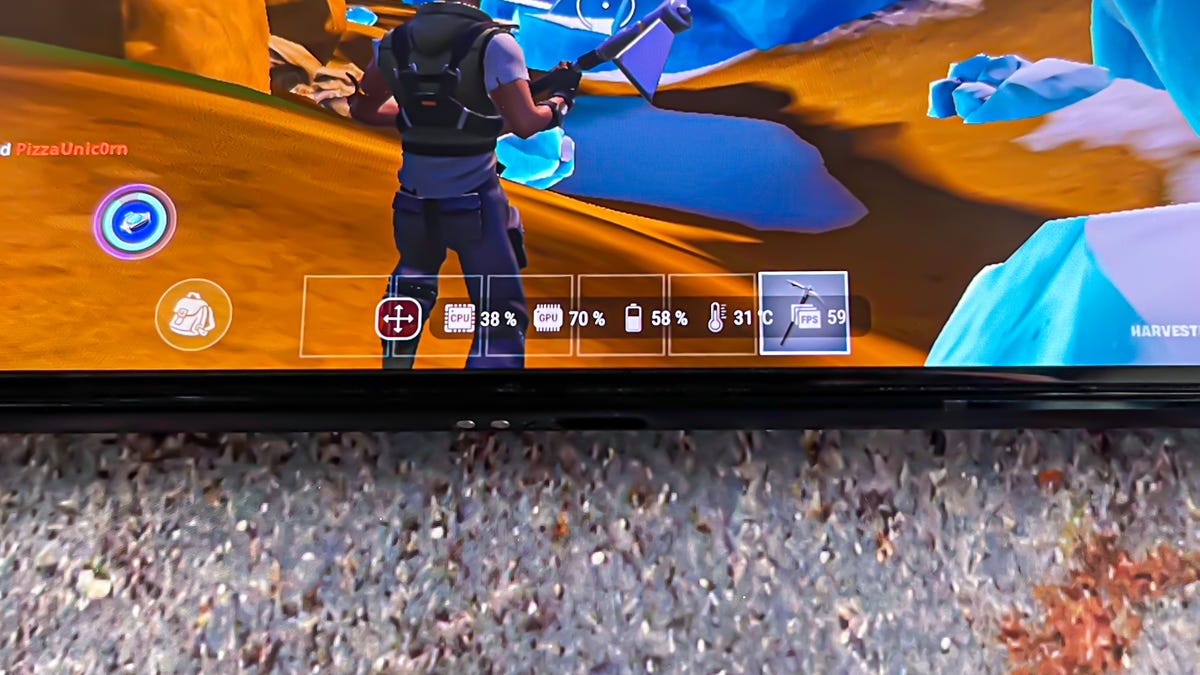

You can add a persistent gauge during games showing stats like the temperature of the phone, frames per second and the battery.
Mike Sorrentino/CNETThe Phone 7 Ultimate is especially speedy, and when I open games I can easily crank up the graphics and frame rate settings to their highest. Setting Fortnite to run at 90 frames per second didn’t bog down the phone, nor did playing Mortal Kombat at 160 frames per second. Even games that don’t support a high frame rate still benefit from the Snapdragon chip and the phone’s memory. For instance Marvel Snap’s cards animations looked very smooth as did Mario Kart.
In benchmark tests, the Phone 7 Ultimate performed comparable to phones like the Samsung Galaxy S23 and the OnePlus 11. While raw power isn’t necessarily what separates gaming phones from mainstream ones, it does underscore that Asus’ software additions and hardware customizations are focused on its gamer audience.
Benchmarks
Legend:
Note:
Higher scores are better
3DMark frames per second
Legend:
Note:
Higher scores are better.
The Phone 7 Ultimate emphasizes horizontal game play. It has an updated version of its AirTriggers system to program the phone’s various sensors on a game by game basis. Like RedMagic gaming phones, you can use the corners of the phone to respond as shoulder buttons. For instance, when playing Fortnite, I set up the right shoulder button to shoot and the left shoulder button to swap between aiming modes.
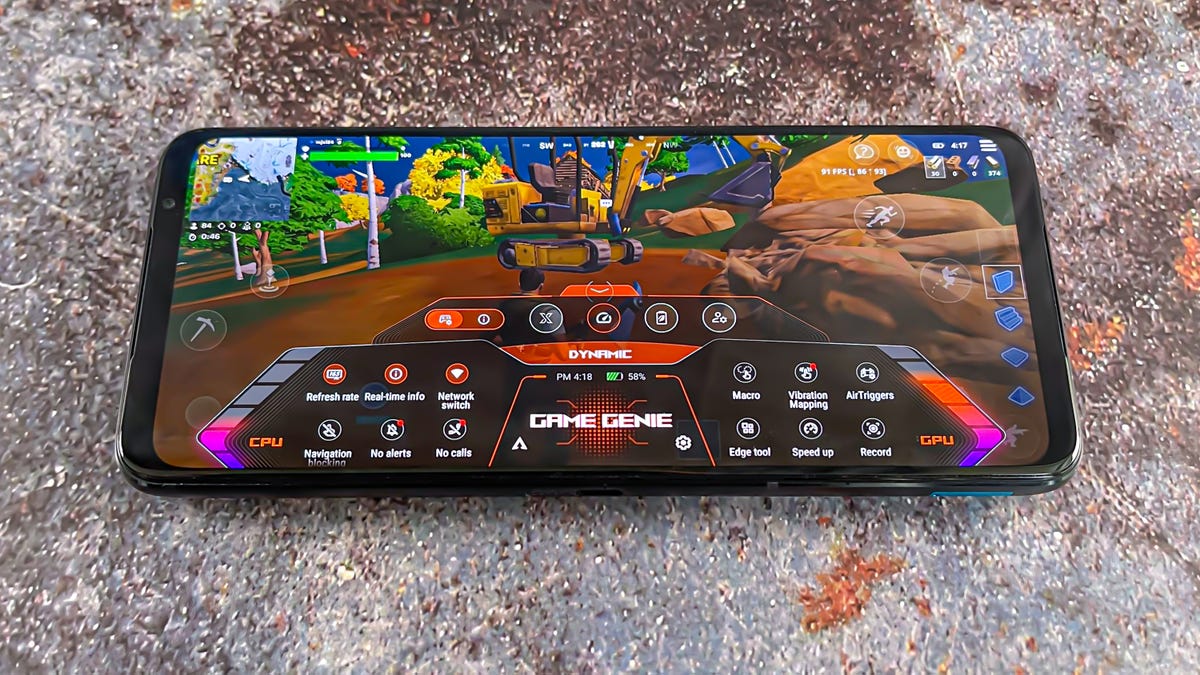

The Game Genie dashboard lets you turn on many of the phone’s settings while you are playing a game.
Mike Sorrentino/CNETAsus also lets you program the phone’s gyroscope for various motion controls and gestures. Overall, there’s a lot of options for those that link to tinker, but I would like to see Asus include suggested controller templates for popular mobile games in future updates.
There’s also program macros — a series of commands that repeat over and over — which, when combined with Background mode, lets you set and forget certain game tasks. In order to protect your phone’s battery, a persistent notification will display when a game is in Background mode so you eventually remember to turn it off.
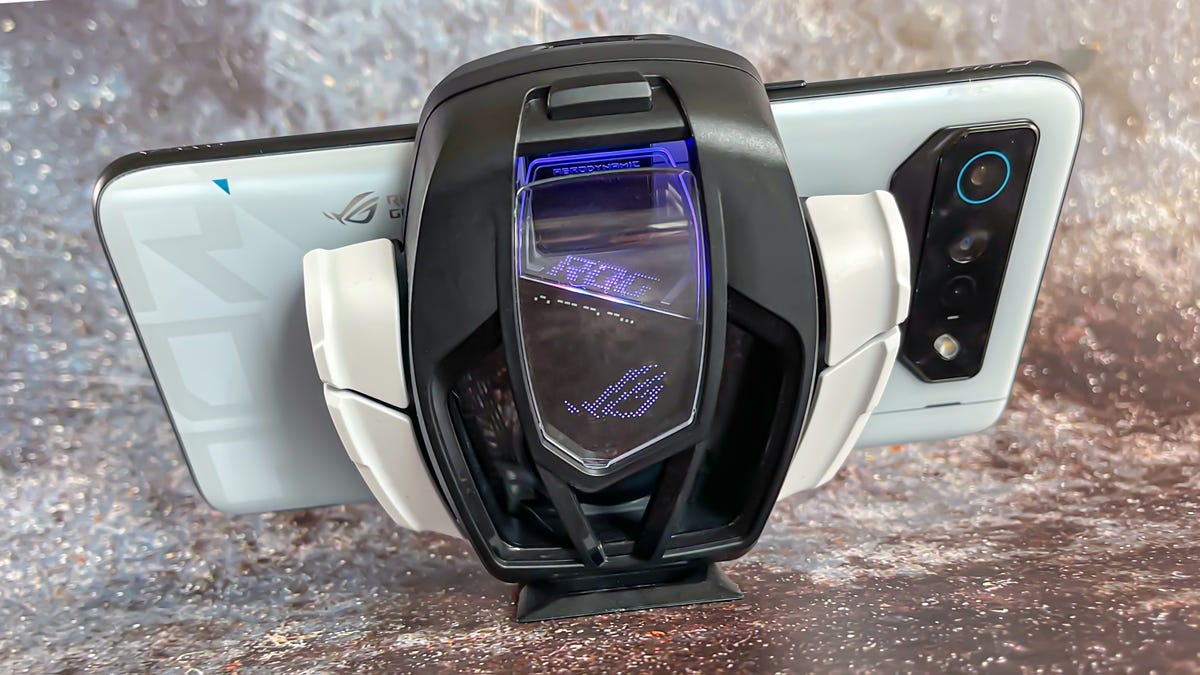

The AeroActive Cooler 7 attaches to the back of the phone. When attached, a door opens on the phone to let in more of the fan’s air.
Mike Sorrentino/CNETAsus ROG Phone 7 Ultimate cooling system
The Asus ROG Phone 7 Ultimate makes cooling a priority, whether or not you are using the included AeroActive Cooler attachment. Asus designed the inside of the phone to help with heat dissipation, and while I could certainly feel the phone become warm while playing games or fast charging, it was never uncomfortable to hold. Though adding a case goes a long way to keep heat away from your hands. According to the phone’s temperature gauge, after 30 minutes of gameplay it reached 40 degrees Celsius (104 degrees Fahrenheit).
The AeroActive Cooler plugs into the side USB-C port and clamps down over the power button. The attachment has cooling fans and opens the hidden door on the back to push cool air inside. There’s also programmable buttons and LED lights on it. During another 30-minute stretch of gameplay with the fan attached, the phone’s temperature dropped to 38 degrees Celsius (100 degrees Fahrenheit). Cooling aside, the AeroActive Cooler feels like there’s a big metal spider on the back of the phone. It’s uncomfortable, especially when I played touchscreen-heavy games.
The accessory also has a kickstand for propping it up on a table and using a Bluetooth game controller, which could be more comfortable.
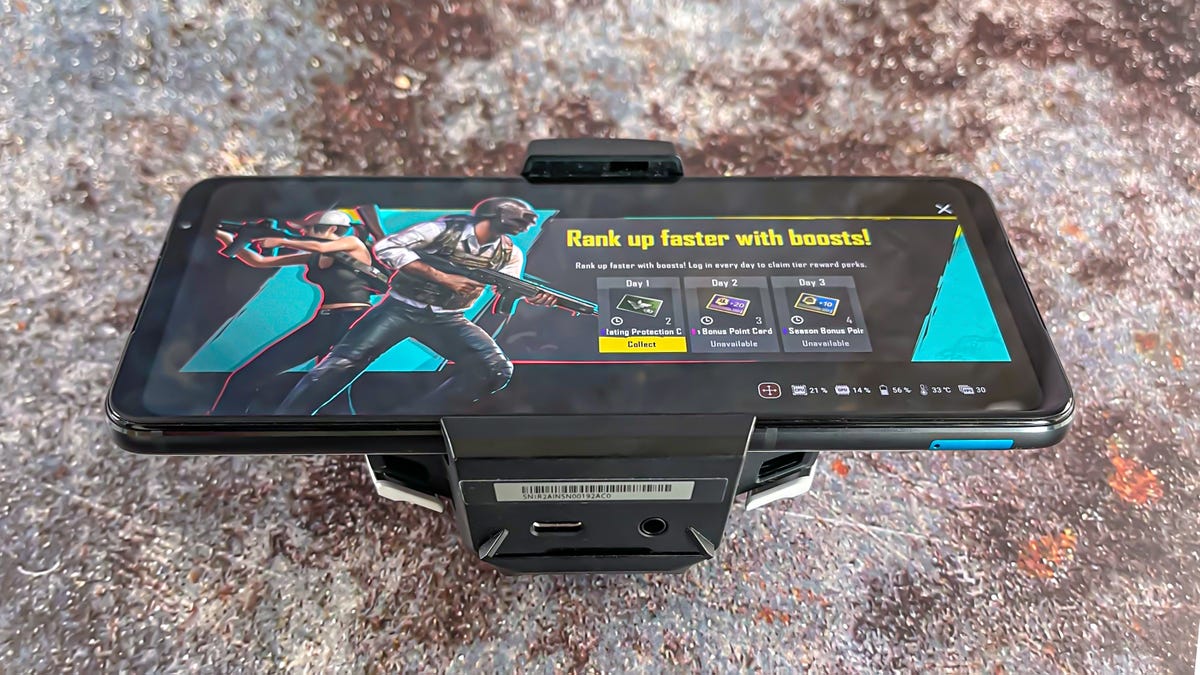

The bottom of the cooling accessory includes another USB-C port and a headphone jack.
Mike Sorrentino/CNETAsus ROG Phone 7 Ultimate cameras, photography
The Phone 7 Ultimate has a 50-megapixel main camera, a 13-megapixel ultrawide camera and an 8-megapixel macro camera. The front-facing camera has a 32-megapixel sensor. There’s Portrait mode and Night mode. You can record videos at 8K 24fps (frames per second) and in 4K at either 60fps or 30fps.


Photo of Citi Field taken on the Asus ROG Phone 7 Ultimate.
Mike Sorrentino/CNETPhotos are adequate. The Phone 7 Ultimate performed just fine in a variety of settings like at Citi Field or in Central Park for a wedding. This isn’t going to be a phone that you use for taking the best Instagram photos, but it works as a way to grab a quick picture in most environments.


Wagner Cove in New York’s Central Park, taken on the Asus ROG Phone 7 Ultimate.
Mike Sorrentino/CNETOn the whole, Phone 7 Ultimate photos lacked detail, especially compared to images from my iPhone 12 Pro Max. Take a look at the photos below of me standing in Central Park. You can see the flowers’ details substantially clearer in the iPhone photo. I’m shocked at how different the lighting looks in the two photos.


Here’s the Asus ROG Phone 7 Ultimate’s photo
Mike Sorrentino/CNET

And here’s the one from the iPhone 12 Pro Max.
Mike Sorrentino/CNETThe Asus’ Portrait mode fared slightly better, despite the background blur on the flowers looking inconsistent. Selfies similarly lacked detail, but the front-facing camera is serviceable for video calls. Photo and video capture is a common compromise for most gaming phones.


Using Portrait mode on the Phone 7 Ultimate helped bring out more color during this Central Park scene.
Mike Sorrentino/CNETIndoor front-facing camera photo on the Asus ROG Phone 7 Ultimate, taken while filming the video review for this phone.
Mike Sorrentino/CNETAsus ROG Phone 7 Ultimate bottom line
The Asus ROG Phone 7 Ultimate is tailored for mobile phone gamers that want to tweak Android games while playing them at their highest graphics settings. New additions like the phone’s new Snapdragon chip, controller options and upgraded cooling system further refine that experience, while providing a sharp refresh rate with fast speeds that benefit non-gaming tasks like apps and reading.
Most people will likely be happier with a phone like a Galaxy S23 that has better cameras and a slimmer body. Also, many Android games run just fine on regular phones.
For a gamer that puts specs above all and wants lots and lots of customizable options, this ROG Phone 7 Ultimate is packed with them. We haven’t yet reviewed the competing RedMagic 8 Pro series which has the same chip with a lower $649 starting price. However, the software experience on the Asus is very good, achieving a nice balance between being a gaming device and a mobile phone.
How we test phones
Every phone tested by CNET’s reviews team was actually used in the real world. We test a phone’s features, play games and take photos. We examine the display to see if it’s bright, sharp and vibrant. We analyze the design and build to see how it is to hold and whether it has an IP-rating for water resistance. We push the processor’s performance to the extremes using both standardized benchmark tools like GeekBench and 3DMark, along with our own anecdotal observations navigating the interface, recording high-resolution videos and playing graphically intense games at high refresh rates.
All the cameras are tested in a variety of conditions from bright sunlight to dark indoor scenes. We try out special features like night mode and portrait mode and compare our findings against similarly priced competing phones. We also check out the battery life by using it daily as well as running a series of battery drain tests.
We take into account additional features like support for 5G, satellite connectivity, fingerprint and face sensors, stylus support, fast charging speeds, foldable displays among others that can be useful. And we of course balance all of this against the price to give you the verdict on whether that phone, whatever price it is, actually represents good value.

